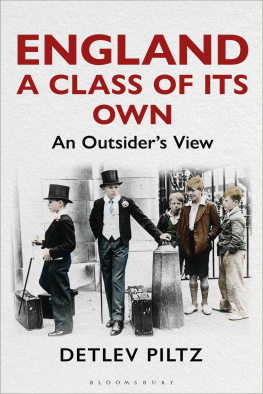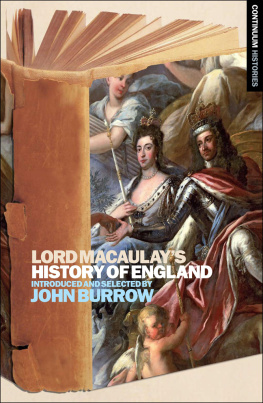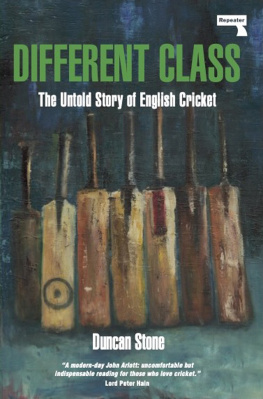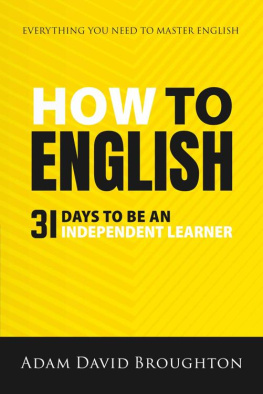

Contents
Englishness is a peculiar beast. The natives use the term straightforwardly, with the ease of familiarity. If asked to explain it, their initial response tends to be a rather protracted W e e e ll , followed by quite a long pause. Englishness is rather like the unicorn a creature whose appearance is known to all, but which no-one has ever seen or touched: it has a presence, yet at the same time is elusive. Perhaps it is knowing that the desire for a precise definition of Englishness can never be realized that makes the craving for it so insatiable. To eat from the tree of Englishness is to be forever in its thrall and, having partaken, the author is no exception.
A prominent feature of Englishness is class not in the meaning of excellence (although this is often encountered in England), but in its social sense, signifying the division of society into various groups. Class embodies differences between people, and in England has both tangible and intangible dimensions. In the former case, class is openly discussed as something defined by occupation, income and wealth, and education: the hard class markers. The intangible aspect is not aired in public and is a subject almost shamefacedly concealed, denied and glossed over. It finds expression in the soft class markers. These have something mysterious about them, even more so today than in the past, because class differences are regarded as unseemly. Nevertheless, they exist, although they are not always easy to detect. Having hair does not reveal which class you belong to, but how you wear it most definitely does. Being a dog-owner does not indicate your class, but the breed you choose speaks volumes. Owning a car is not a class statement, but how often you wash it is. Going on holiday has nothing to do with class, but what you do when you get there certainly has.
The English know about class. Otherwise why would the phrase It depends on your class be heard so much? Class is even harder to pin down than Englishness because, while Englishness is acknowledged and admired by many, class is to some extent off limits and widely condemned surely a good reason for bringing it out in the open, without value judgement.
This book attempts to provide a snapshot in words of the English class system not only from its best side, but warts and all, as Oliver Cromwell might say. There are occasions when distorting impressions to the point of caricature cannot entirely be avoided. But is that not quintessentially English, given the great and grand tradition of caricature in England? Has the author come any closer to understanding Englishness and its hallmark, class, in the course of writing this book? Perhaps. At any rate, he is even more fascinated by England than before, and has not escaped the biographers fate of falling in love with his subject.
My first and overwhelming thanks must go to the wonderland that is England and its wonderful, wonderment-inducing and sometimes wondrously wacky people. To study them makes it virtually impossible not to become an anglophile. My second thank-you goes to all those who have opened my eyes to Englishness and class when I was unseeing, or who have corrected my misconceptions. For their keen-sighted reading of the manuscript I thank Hans-Wolfgang Arndt, Robert Colls, Richard Jenkyns, Geoff Sammon, David Walker and Alexander Piltz. Special thanks go to my publisher Robin Baird-Smith for his confidence in this book, to Jamie Birkett for his great skill and attention to detail and also to Sarah Jones for project editing the book through to publication. Any mistakes and inaccuracies contained in this book are of course my own, especially where they are there by design.
Autumn 2021, Detlev Piltz
Class does not matter in England say some. England is divided by class say others. The classes struggle against each other say some. The classes live in harmony say others. And so it has continued since time immemorial. Quotations from a stroll through 240 years of English history say it best.
I will back the masses against the classes.
Prime Minister William Ewart Gladstone, 1886
There is no change which is more marked in our country than the continual and rapid effacement of class differences.
(Later) Prime Minister Winston Churchill, 1940
England is the most class-ridden country under the sun.
Novelist George Orwell, 1941
The class war is over.
Prime Minister Harold Macmillan, 1959
Margaret Thatcher is fighting for her class, I am here fighting for my class.
President of the National Union of Mineworkers (NUM) Arthur Scargill, 1984
I want to get totally rid of class distinction.
Prime Minister Margaret Thatcher, 1985
We are all middle class now.
Deputy Prime Minister John Prescott, 1997
A childs social class background at birth is still the best predictor of how well he or she will do at school and later on in life.
Prime Minister Gordon Brown, 2008
The sharp-elbowed middle classes like me and my wife.
Prime Minister David Cameron, 2010
It is virtually impossible to open a newspaper today without headlines such as Britains obsession with class is defeated on the one hand, or Classless Britain is a myth on the other leaping out at you from the page not infrequently in the same publication. Who should we believe? The politicians, the scientists, the media?
Class exists. The very fact that the Great British Class Survey was conducted in 2013 by the BBC, together with the huge response it generated, demonstrates that classes are real. What has changed is their weight and their markers. Class is not talked about in public, but is played down or even denied altogether. Class is the elephant in the room. The traditional, hard markers of occupation, income, wealth and education or title are no longer reliable in isolation and only signify social class in conjunction with other, soft markers such as accent, language usage and behaviour. Although this has always been the case, the weight of hard class markers has steadily declined, while soft class markers have gained in importance. All the more reason to look at them more closely.
The first part of this book lays the foundations. In view of the English reticence to speak about class and widespread tendency to deny its very existence, a number of things must be brought out in the open. Why is the phrase It depends on your class heard so often? Class or something like it must exist, together with the accompanying social framework. The focus of class is on differences between people. But which ones? This section therefore deals with inequality, the definition of class, the traditional class markers and the age-old division of society into working, upper and middle classes, and possibly an underclass as well. It also explores the implications for people of belonging to a class. The fear of class and a class society leads to the phenomenon of class denial, which is expressed not only by flatly rejecting the notion, but also in language, dress and behaviour. For politicians and their parties to gain and retain power, they rely on the votes of people from all classes. Class and politics are therefore inextricably linked.
Part two of the book is devoted to what are termed the soft class markers. They stand alongside the hard class markers (occupation, income, education) that dominate the official studies and statistics on class. Unlike the latter, they are not quantifiable, but they are no less visible and may these days even be more important. The standards by which people measure the soft class markers of their fellow human beings are not written down anywhere, but are soft and silent (). These soft class markers include virtually all the characteristics and activities through which people achieve self-realization, their language (including accent and terminology), manners, attitudes, dress, leisure activities, furniture and even their gardens and pets.












